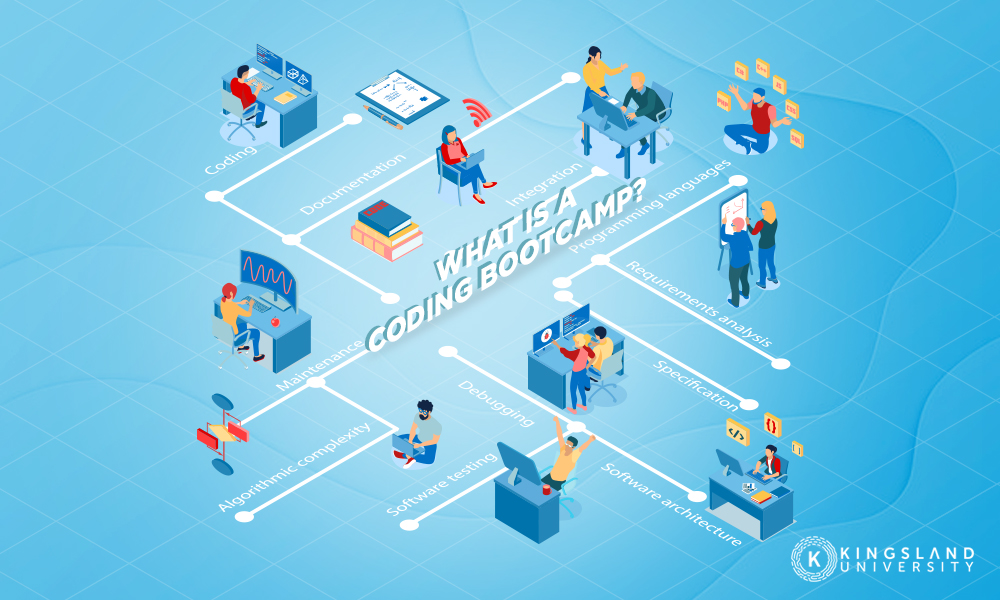
Perhaps you are considering attending a coding boot camp, and you’re wondering about your job prospects. Maybe you’ve already decided on a career path, and you’ve completed a coding boot camp to start the journey. Maybe you’ve been sending out applications for a while, and you’re not getting many bites. So you start to wonder: are boot camps a good tool to help you get a job?
While graduating from a boot camp might help you with the basic skills you will need to start on your path as a programmer, it might not guarantee a career. Most programmers require a wide array of skills to make them more appealing to prospective employers. Attending the boot camp might help, but there are other aspects you should consider before dedicating yourself to a program in the hopes of a “quick hack” to alter your career path.
What is a Coding Bootcamp?

A coding boot camp, much as the name implies, is a crash course in the fundamentals of programming and coding necessary for prospective developers to possess. The goal of coding boot camps is to be short-term with an accelerated curriculum to jumpstart a professional coding career. Most coding boot camps focus on things like web development or security and aim to turn neophytes into capable coders. Boot camps tend to share several qualities:
- Length: Coding boot camps are structured to take less than four months to complete successfully. According to an assessment from Course Report, the average length of a boot camp is approximately 14 weeks.
- Cost: The general cost of a coding boot camp varies based on several factors, including whether you are attending in person or virtually. Once again, Course Report’s assessment places the average cost at approximately $14,000.
- Programs: Like most educational facilities and industries, several institutions offer viable boot camp programs. These include freeCodeCamp and Codecademy, to name a couple. However, the trick is figuring out which program is best.
A coding boot camp can be an excellent introduction to the world of programming and an effective way to start on a career path. In some cases, graduation from one of these boot camps can even get you your first job as a programmer. However, it is not the only thing you might need to successfully maneuver the world of professional coding, web design, and cybersecurity and may not be sufficient to put you over other candidates seeking the same position.
What Do You Really Need?
While it may seem counterintuitive to pursue other forms of education or experience in addition to a coding boot camp, the fact is that almost every boot camp informs their students that they are not the proverbial “easy way out.” Coding boot camps do offer additional benefits to their attendees but do not guarantee employment after graduation.

Some employers of web design or cybersecurity firms have more stringent requirements than graduating from a coding boot camp. According to job listings posted on the hiring website Indeed, many employers may seek everything from educational to professional prerequisites before a prospective hire is considered.
Educational Requirements
Like most any job, web design and cybersecurity firms could expect their prospective hires to have a formal education. The education required may vary depending on the firm but will often have the same basic framework.
According to job listings on Indeed, here are some of the expected educational requirements for positions as a web designer or cybersecurity professional:
- Sofia-King-Creative-Group, LLC: This firm, offering a junior web developer position, prefers its candidates to have an associate’s degree in a design-related field.
- Live Free Armory: This firm, which offers a web developer/designer position, lists that they would be more likely to consider a candidate with a bachelor’s degree for the position.
- SAIC: This company offers a position for a cybersecurity engineer and requires a bachelor’s degree as a minimum qualification for hiring consideration.
- Las Vegas Sands Corp.: This company expresses a preference for an associate’s degree for a potential cybersecurity analyst position at the entry-level.

The educational needs for a web design, development, or cybersecurity position are among the more flexible and more straightforward to acquire. Attending a university to get a formal education in computer science or design to contribute to your qualifications will never steer you in the wrong direction.
Professional Requirements
One of the more difficult requirements for any position is the catch-22 of experience. Looking at job listings on any hiring site for even entry-level positions in the web design or cybersecurity fields can be a shock. You’ll often find a minimum requirement of a couple of years of experience in the field to qualify. Sometimes, the experience requirement can even serve as a substitute for a degree.
- Las Vegas Sands Corp.: Previously cited for having an education requirement, this company also requests a minimum of 1 to 2 years of professional experience in place of or in addition to the educational requirement.
- Bulletproof: Another cybersecurity firm, this one expects a minimum of 2 to 4 years of professional experience in the field of network support.
- United Nations Development Programme: A more intensive employer, the UNDP requires a combination of a master’s degree and five years of professional experience.
- IML Company, LLC: Another web design position that requires at least one year of professional experience in using specific tools used by programmers and coders alike.
The professional requirements are some of the more demanding criteria for those seeking employment. Every senior position in the world will require strict criteria for consideration, but the real challenge is in the entry-level positions that demand experience. While you might find it odd for an entry-level position to have experience requirements, it is not as uncommon or as unobtainable as you might initially believe.
Degrees
One of the first things you could consider pursuing to boost your odds of being hired is to investigate degree programs for computer science, design, or any other major related to the field of coding. A programming boot camp helps in leaps and bounds by providing you the experience needed to know your way around coding languages or tools, but a degree helps you stand out further as a dedicated seeker of programming employment.

Almost every university in the world, save for a select few with dedicated curriculums to one or two major types, offers a computer science degree plan. Using an associate’s degree to get your foot in the door professionally, then proving yourself as you refine your skills can more than makeup for the difference in the degree plans.
Internships
While it may seem paradoxical, entry-level positions that require experience have an awfully specific idea in mind. The most common form of experience for entry-level positions revolves around internships.
An internship is, generally, an unpaid position offered to university students to give them a level of experience in their field. This helps provide a professional understanding and makes prospective employees more appealing to their employers.

According to a study conducted by Fremont College, there are eight primary advantages to an internship.
- Experience: As befits the topic at hand, internships provide students with firsthand experience in their field of choice. This includes web design, development, cybersecurity, and virtually any kind of coding or programming career that exists.
- Exploration: Another significant benefit of internships is that they let you explore your prospective career path in a non-committal fashion. In doing so, you can determine if it is really the career you would best be suited for before you fully commit to a life as a cybersecurity engineer or web developer.
- Jobs: Tying back into the experience aspect, internships show a dedication to your career and a proactive attitude that makes you a more appealing prospect for employment with virtually every employer in the world. A cybersecurity firm would be more interested in hiring you if your free time was spent helping around a similar firm in your university days.
- Skill Refinement: Providing you with professional experience, internships allow you to put your current skills to the test and see just how effectively they translate on the front line of your career. While a programming boot camp gives you the general knowledge you will need to code successfully, internships allow you to better understand your career on a firsthand basis.
- Compensation: While most internships are unpaid, a select number of competitive slots offer paid internships. By acquiring a paid internship, even non-students can build up professional experience and get the finances they need to further their education or pay for their daily needs.
- Networking: One of the most valuable benefits of internships is the opportunity to rub elbows with established professionals and make connections in the industry. Impressing a well-established programmer at your internship could lead to their recommendation to hire you in the future.
- Confidence: Internships, due to their status as a beginner position, allow you to experiment with techniques and tactics in the field that you otherwise would not learn in a classroom setting. Since interns are expected to stumble, these experiments allow you to develop yourself and figure out what works and what does not before getting into an actual position where such mistakes are punished far more harshly.
- Transition: One of the best possible outcomes of an internship is impressing the firm so much that they cement your internship into a full-time position with them. Most companies will seek to use internships to build their ranks and ensure that their new hires can handle themselves the way they expect and require.
Internships are a valuable medium to enhance your professional standing and build up the experience you need to get the more demanding entry-level positions in the world of coding and programming. Almost every company and corporation in the world offers internships, and many educational programs at established universities require an internship to complete the curriculum. It never hurts to consider getting an internship and working towards one that even offers pay.
Certifications
If committing to an educational curriculum is not something you are currently able to do, there are other ways of enhancing your résumé. Information technology (IT) professionals can enroll in certification programs to prove their skill and understanding to make them more appealing. Indeed lists 15 certifications that IT professionals would be wise to consider. The top 5 of which are:
- Microsoft Technology Associate Developer (MTA): Cited as the “ideal set of software certifications” for those new to the programming world, the MTA certification guides programmers in the development of Microsoft Windows games and applications. This certification is excellent for an all-around piece of evidence that the programmer can handle themselves with established mainstream software.
- Microsoft Certified Solutions Developer (MCSD): A supplement to the MTA certification, the MCSD offers credentials to tackle web, Microsoft Windows, and SharePoint applications. This certification makes a prospective employee far more appealing to Microsoft.
- Citrix Certified Associate-Virtualization (CCV-A): The CCV-A certification allows a programmer to manage XenApp and XenDesktop programs and applications. However, the CCV-A certification requires completion of the 1Y0-203 exam. This certification is best suited for software administrator and engineer candidates.
- AWS Certified Developer-Associate (AWS CD-A): The AWS CD-A certification proves the ability to develop applications and programs from the Amazon Web Services cloud. The AWS does not require any prerequisite certifications but does suggest that the enrollee have six months of on-hand experience with cloud applications. This certification is a fantastic choice for those seeking employment from cloud-reliant companies.
- AWS Certified Solutions Architect-Associate (AWS CSA-A): The AWS CSA-A proves that the holder can maintain and deploy scalable applications, design in the AWS platform, input and export data, and other AWS-specific situations. This certification is one of the most important for those seeking employment from companies seeking AWS-certified employees.

Other certifications are available for a variety of career paths, including cybersecurity programs and other technical careers. Certifications, while excellent for improving one’s professional appeal, are not easy to acquire. This makes those who hold them much more likely to be hired. But acquiring the certifications is more likely with an education. Programming boot camps also give you a boost to successfully passing a certification course.
The Point
Coding boot camps are a fantastic medium for getting your feet wet in the programming industry. However, they might only take you so far. While some companies will see boot camp graduation as sufficient to give you a chance, you may still be less likely to be hired over someone with further qualifications without padding your own as well.

Education, certification, and internships help you shine past what the average boot camps can offer you and will skyrocket your chances of getting hired. In a world where professional positions are a highly competitive commodity, it never hurts to have more to offer.


